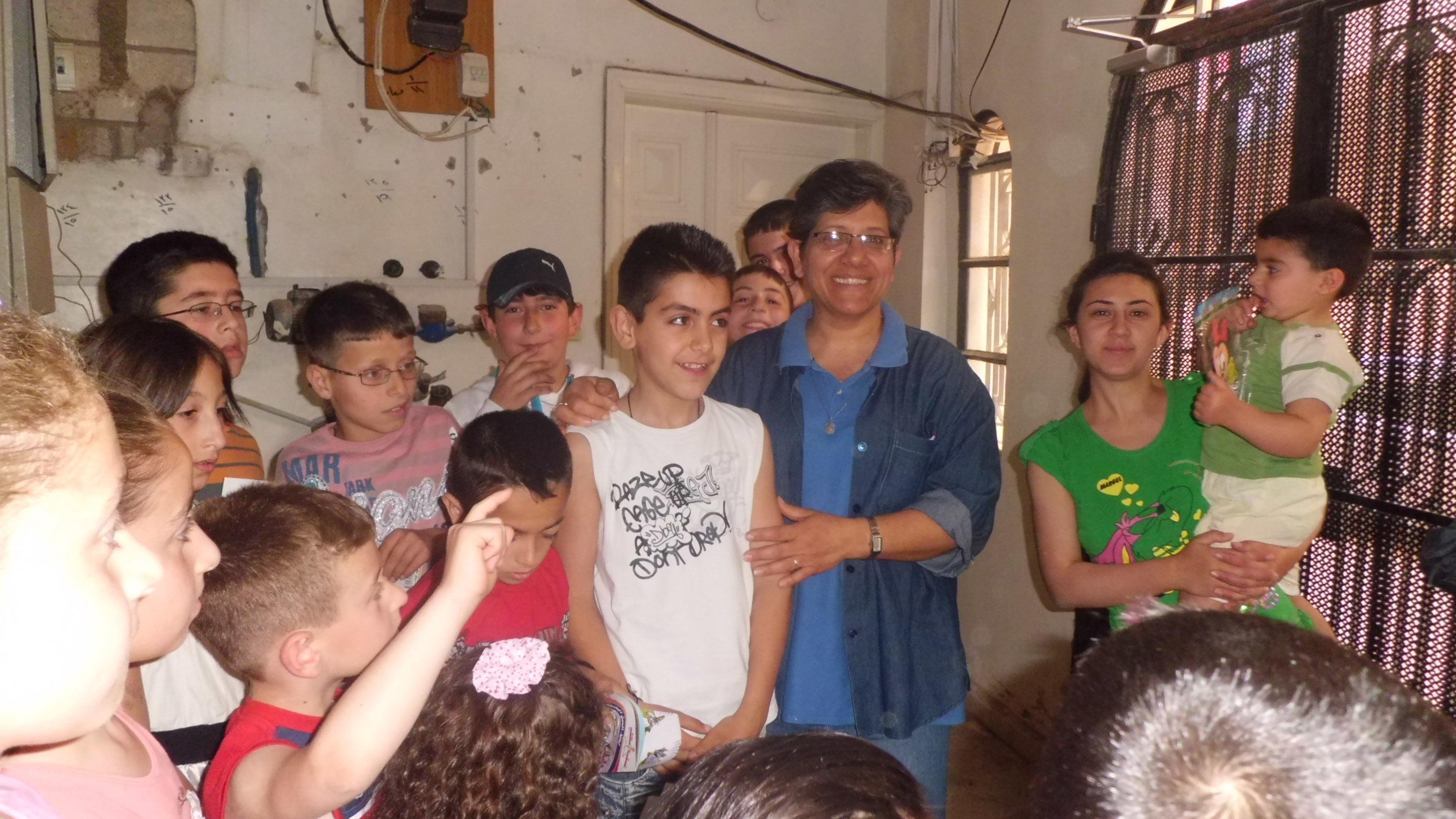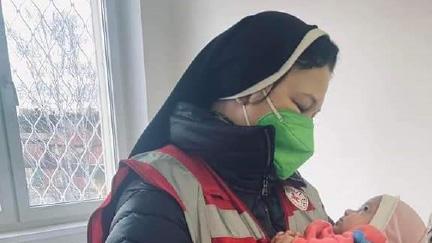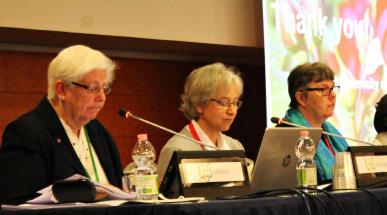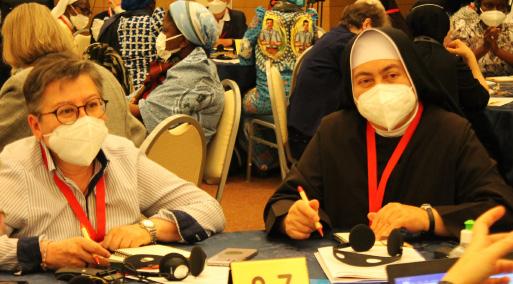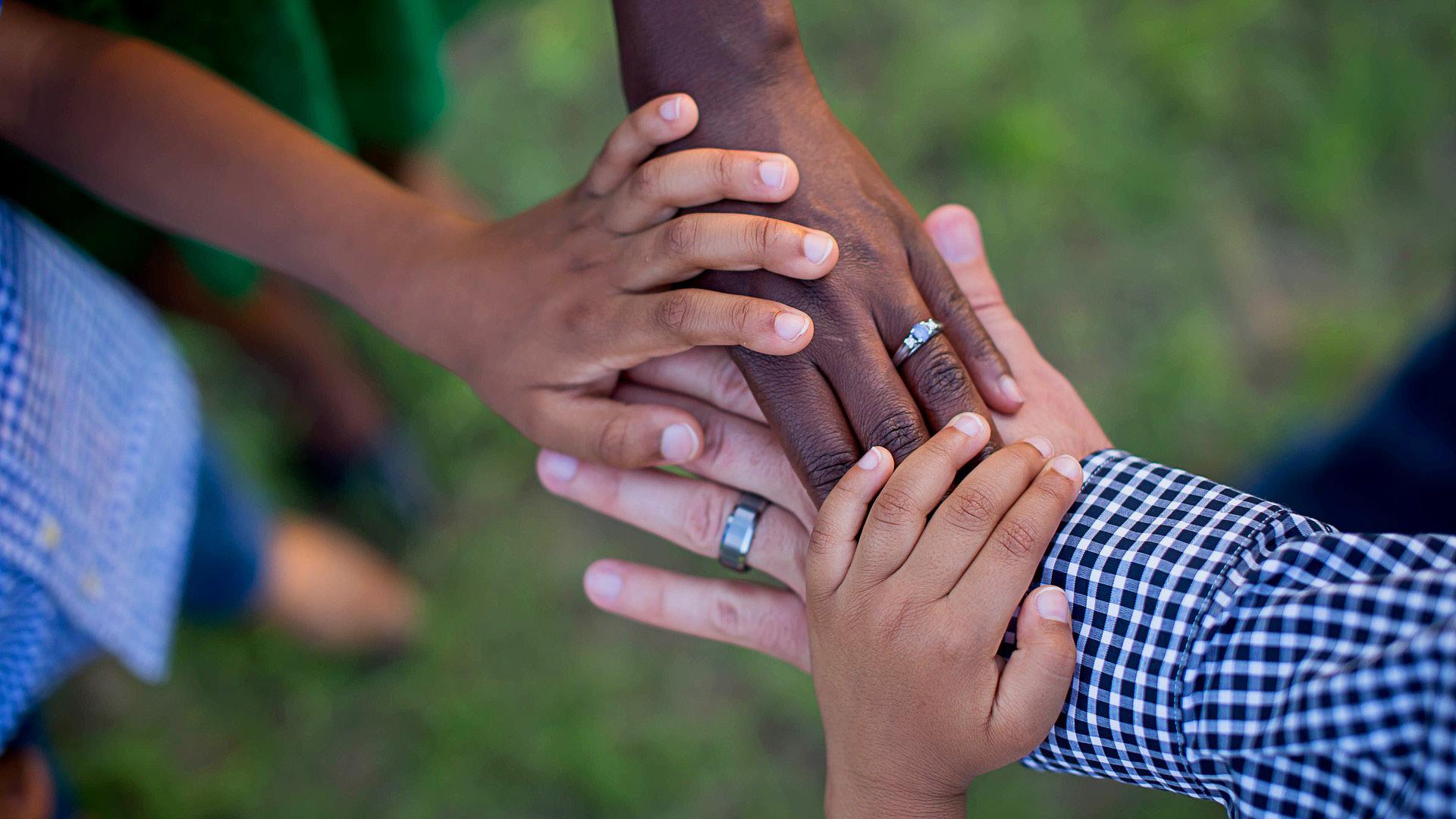
9 minute read
Report on UISG Initiative: Sowing Hope for the Planet
UISG - Bulletin n. 178, 2022 Sr. Sheila Kinsey, FCJM
Advertisement
Coordinator of Sowing Hope for the Planet
Vision Statement Sowing Hope for the Planet
We commit ourselves to both personal And communal conversion and We wish to move forward together In an orchestrated and coordinated response In listening to the cry of the Earth And the cry of the Poor As we go forth as instruments of hope In the heart of the world.
(Accepted by Acclamation by UISG Superior Generals at 2019 Plenary)
Report on UISG Initiative: Sowing Hope for the Planet - May 2019 - May 2022 Sowing Hope for the Planet is a project in which all Sisters whose congregations are members of UISG and their connections, are provided an opportunity to actualize Laudato Si’ and to make a difference in our care of the planet. Our goal is “to become painfully aware, to dare to turn what is happening to the world into our own personal suffering and thus to discover what each of us can do about it.” (LS 19) The UISG Board in June 2018 endorsed the UISG initiative which was to be coordinated by the JPIC Commission of USG-UISG. At the 2019 UISG Plenary the vision statement was accepted by acclamation by the over 850 Superior Generals assembled for the meeting. To carry this vision forward, the various constellations met in their respective groups
Sr. Sheila Kinsey, FCJM - Sowing Hope for the Planet
UISG - Bulletin n. 178, 2022 to determine their actions regarding the Cry of the Earth and the Cry of the Poor. Many of these were collected and placed on the website of Sowing Hope for the Planet as a public witness of the work of the religious in their respective areas. The website, Sowing Hope for the Planet, is very interactive and includes a mapping of the various advocacy initiatives which are focused on the seven Laudato Si’ Goals. This interest also served as a basis for the skill training on advocacy sponsored by the other UISG Project ‘Sisters Advocating Globally’. A number of webinars have been developed throughout these years to update our participants on new developments, to become aware and to be included in events such as the Season of Creation, the Amazonian Synod, and COP’s, and provide timely updates. To date 17 webinars have been presented since 2019 and more are scheduled for this year. Some of the topics have been on sustainability, synodality, realizing the entirety of the Laudato Si’ goals, and responding to the Cry of the Earth and the Cry of the Poor. The webinars were planned to provide information on these events and promote a spirit of networking. These experiences were developed to be practical, informative, challenging, inspirational, and encouraging. Special tools have been developed for contact persons to use in their own development of plans and experiences of their local communities and congregations. Emphasis has been placed on building on the congregational charism, planning the transitions to the Laudato Si’ Goals which are regularly evaluated and being public about these commitments. To keep religious leaders informed, regular mailings have been sent to the Superior Generals to keep them updated on what has been happening with new developments with SHFP and the Laudato Si Action Platform. The LSAP was developed through much input from the experience of religious. We participated in the panel when Pope Francis launched the LSAP in May of 2021. We are leaders of the Religious Sector, members of the Laudato Si’ Steering Board and on the Ecology Task Force of the COVID-19 Commission. All of these opportunities have contributed to the development of the Vatican sponsored LSAP. The resources developed for SHFP are also being shared with the LSAP website. Sowing Hope for the Planet continues to take special care of the religious, both men and women, even as we strongly support the involvement of congregations in the LSAP. We have developed for religious the LSAP guide, tools for planning, and the best practices notebook. These joint efforts continue because the LSAP is inclusive of 7 sectors with their various needs. Sometimes in the effort of being universal, there are still particular areas that will need special attention of various individual sectors. This is shown as we list them: 1) Families, 2) Educational Institutions, 3) Economy, 4) Religious Orders, 5) Parishes & Dioceses, 6) Hospitals & Healthcare Centers, and 7) Organizations & Groups. A beneficial relationship is growing between the project of Sisters Advocating Globally and the advocacy efforts of the participants of Sowing Hope for the Planet related to the Laudato Si’ Goals. Based on advocacy data from its mapping survey tool, SHFP has hosted seminars on biodiversity, climate change, mining, migration, and ecological economics. The seminars provided a space for members to share information about their work and create networks. In partnership with SAG, SHFP is currently hosting a series of Advocacy Training Sessions focused on further developing these important topics. Case studies are provided by participants in the course. This is another way of enhancing our work with the LSAP and sharing our efforts with a wider concerned audience around these areas. The goals of SHFP have been impactful and largely have exceeded expectations. We have helped to develop the capacity and the flexibility of the LSAP. Our Congregations and the Local Communities together comprise the highest number of enrollment. A survey was sent out to the representatives of the constellations asking for specific feedback as to what the members have been doing regarding their specific actions as well as an evaluation
Sr. Sheila Kinsey, FCJM - Sowing Hope for the Planet
UISG - Bulletin n. 178, 2022 of the fruits of Sowing Hope for the Planet and their experience of the Vatican’s Laudato Si’ Action Platform. A majority, 32 constellations responded and filled out the survey. The pertinent information is summarized in March 2022 as follows: The constellations have responded to the call of Laudato Si’ in a variety of ways. The largest responses where the constellations have increased focus have been in education efforts (75%) and environmental actions (72%).The congregations have also had large responses with congressional planning (66%) and pastoral services (56%). Other actions include relief operations for calamities, work with Religious Conferences, training members in ecological sciences who work on land restoration and regenerative agriculture, health care, divestment from fossil fuels, political advocacy, environmental actions on water, and conservation and recycling. The emphasis on education and the environment shows that the constellations need support on these issues ranging from networking to funding.
The greatest challenge regarding the realization of Laudato Si’ goals reported by the constellations has been in dealing with the COVID-19 pandemic and its ramifications (56%). Following are the economic crisis (47%) which is partially resulting from the pandemic, and the burden of too many responsibilities (45% ). From within the communities, environmental disasters are a serious issue along with lack of interest. Other factors listed included decreasing financial resources, limited foreign languages, and political insecurity in their country. These factors call for more support of members as well as education and community building. Support could be offered by sharing resources, translation services, and political advocacy training and support. Most congregations (85%) still hope to continue developing opportunities for their Laudato Si’ goals. They responded further that some of the possible ways to fulfill their commitment could be inter-congregational collaboration, developing educational programs on caring for the earth, pastoral care and services, developing financial selfsupportive programs, green energy development, work with refugees and asylum seekers,
Sr. Sheila Kinsey, FCJM - Sowing Hope for the Planet
UISG - Bulletin n. 178, 2022 exchange of information at meetings, policy advocacy at the federal level, and ecological restoration involving bee keeping and tree planting. There is enormous support within the constellations about their commitments, especially concerning the environment. The constellations could benefit from access to more educational resources and support materials to further their work in this area. Most congregations (70%) responded that their members are not working with other sectors of the Laudato Si’ Action Platform. The constellations whose members were involved reported the ways that they are working with the sectors of the Laudato Si’ Action Platform. The largest response was with working with educational institutions, parishes and dioceses, and intercongregational and local religious communities. The other sectors of commitment to healthcare, families, economics and organizations and groups also showed some response. The response to this item on the survey may not accurately reflect the constellation involvement but may be due to lack of information about the LSAP sectors. Since the involvement of the sectors is a goal of the LSAP, more

creative and coordinated ways need to be considered to help this process among all of the sectors. The majority of the constellation respondents (90%) find that Sowing Hope for the Planet and its programs are helpful and should continue. Comments included caring for our common home, increasing awareness on our contribution to caring for the planet and what we need to do to sustain it, helping us respond to the changing times, increasing commitment to ecological issues and the protection of life, and helping with the common struggle to protect life and creation. A small percentage responded “no” to the question about Sowing Hope for the Planet. However, when reading their feedback, it is more suggestive of the Laudato Si’ Action Platform and the need for more information and clarity. Their comments said that they already had another platform in their country, there was no need to double the platform, and that to participate in everything was too much.
Sr. Sheila Kinsey, FCJM - Sowing Hope for the Planet From this experience these are the suggested future directions:
1. Continue to offer assistance through personal contact and specific tools as needed. The work of Sowing Hope for the Planet has shown that there are many voices waiting to be heard, if there is a place for them to speak. By offering acknowledgement, support, and outreach in multiple languages, a larger community continues to grow. 2. Offer webinars that provide timely and relevant information. The webinars offered by SHFP have been well attended and attendance is increasing. The webinars are recorded and posted on our website, YouTube channel, and on the JPIC Workshop website hosted on the Thinkific platform. The videos continue to be viewed. 3. Enhance the opportunities for networking both local and international through the organizational format of the Constellations and national religious organizations.
Networking can be enhanced by organizing around issues such as mining or biodiversity, or by language outreach, such as to the Francophone countries. 4. Promote collaboration with the other sectors of the LSAP in actualizing the Laudato
Si’ Goals 5. Strengthen the journey by developing programs and tools based on requests and the needs for skill development. 6. Encourage enrollment each year as members of the LSAP, as this is the place where the efforts of all seven sectors is coordinated to help reach the tipping point for change. (3.5% for action and 21% to 25% for systemic change). In our efforts to reach this point all sectors are challenged to double enrollments each year.
Thank you for all of the ways you have made the world a better place through your efforts to actualize Laudato Si’. Your work is making a difference. This has been a remarkable and fruitful journey in the movement of the Holy Spirit. May God bless your efforts as you move forward Sowing Hope for the Planet.
UISG - Bulletin n. 178, 2022

